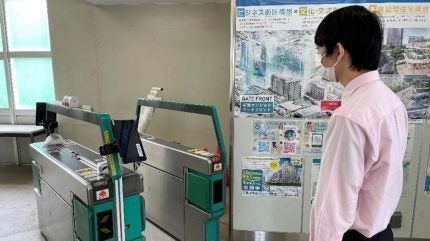
Japanese rail operator Yamaman Co has introduced facial recognition technology to its services on the Yukarigaoka Line in Sakura, allowing people to pay for a ticket with their face in what is believed to be a first for the country.
The upgrades to barriers along the line mean that passengers using the ultra-light rail network will be able to upload a picture of themselves to a ‘Eucalyptus Pass’ account and pair it with a credit card to enable automatic purchases when they enter a station.
Yamaman said: “By changing the payment method for public transportation in the area from the current tickets and magnetic tickets to a new cashless payment method using facial recognition, we will improve the convenience of public transportation.”
In addition to the introduction of the technology, the company has also switched its ticket machines to issue QR tickets for passengers who have not registered for the Eucalyptus Pass.
The launch of the tech, designed by Panasonic and Jorudan, comes after the success of two trials conducted by the three companies on a bus and the Yukarigaoka Line between May and September 2021 to March 2023.
The Jorudan Style Point&Pass system, which cost Y60m ($373.4k) will use cameras to identify passengers and charge their credit card for a Y200 flat fare or Y500 day ticket, similar to a ‘tap in, tap out’ system.
How well do you really know your competitors?
Access the most comprehensive Company Profiles on the market, powered by GlobalData. Save hours of research. Gain competitive edge.

Thank you!
Your download email will arrive shortly
Not ready to buy yet? Download a free sample
We are confident about the unique quality of our Company Profiles. However, we want you to make the most beneficial decision for your business, so we offer a free sample that you can download by submitting the below form
By GlobalDataFacial recognition has been proposed as a way to improve efficiency and security on rail networks for years, with German authorities testing similar software at a Berlin station in 2017, but has seen scepticism from passengers wary of handing over their biometric data.
However, it is perhaps no surprise that a Japanese operator has become one of the first to move to using the tech as its primary ticketing option given the country’s wide embrace of next generation technology.
JR East has also sought to improve its ticketing system with the recent announcement that it would be expanding its Suica payment network to allow its use on a wider variety of services and integrate biometric authentication.



